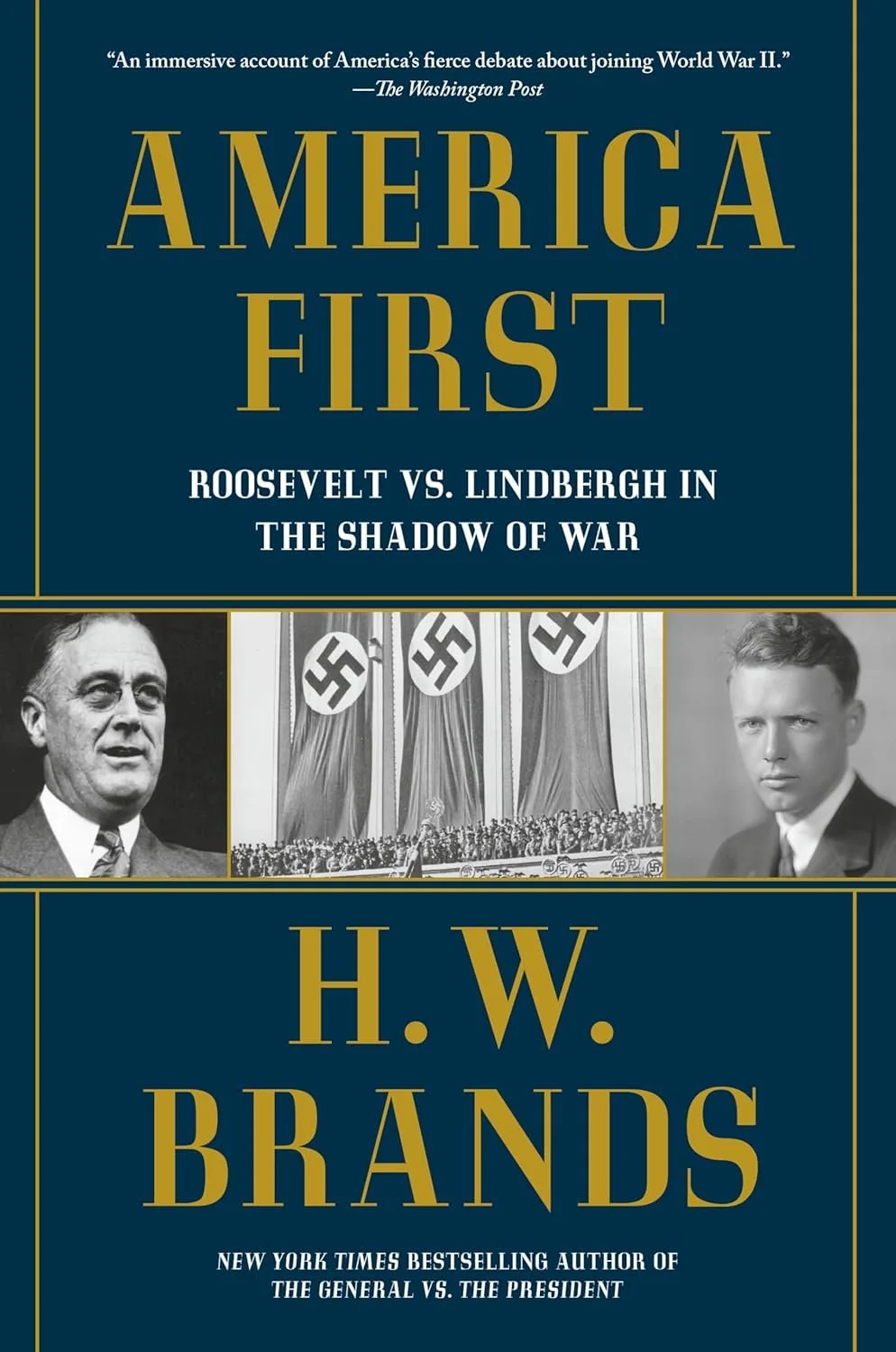Franklin Roosevelt and Charles Lindbergh: Leadership Observations from the 1930s America First Movement
In America First: Roosevelt vs. Lindbergh in the Shadow of War, historian H.W. Brands examines the rise of the 1930s America First movement. The aftermath of the Great War and the Great Depression caused many Americans to question the country’s role in global politics. The harsh terms of the Treaty of Versailles and the Depression's impact on everyday life led to the rise of fascism in Europe. Mussolini was first to come to power, followed by Hitler a few years later.
Brands compares how these two influential figures, President Roosevelt and Charles Lindbergh, each tried to convince the public of the merits of their vision for America’s future.
In the 1930s, Americans were wary of any international involvement and the country leaned strongly toward isolationism. As Europe began to unravel and Hitler started seizing territory, Americans became more concerned about whether America would send troops to fight another foreign war. When war came to Europe, Roosevelt worked with Congress to loosen neutrality laws and find legal ways to send arms to Britain for the war. As concerns rose, several people came together and formed the America First Committee in September 1940. The first chairman was retired Army General and Sears, Roebuck and Co. chairman, Robert Wood. Charles Lindbergh quickly became the lead spokesman, giving 13 speeches across the nation and on radio.
Franklin D. Roosevelt
Roosevelt watched with concern as fascists came to power and dominated Europe. He recognized that the isolation many wanted was not viable. What worked in the 18th century would not work in the 19th. The global economy had become intertwined. Advances in military technology and capabilities have made the Atlantic and Pacific oceans much less of a barrier than they were before.
FDR recognized the need to educate the public. He worked with Congress to chip away at the nation's neutrality laws. During his speeches, press conferences, and fireside chats, he patiently built the case for American involvement. Roosevelt consistently said that he did not want to send American troops to Europe. His opponents said he was lying. He was likely telling the truth but saw the inevitability of war. To ensure America was ready, he broke with tradition and ran for a third term as President. No doubt he also wanted to maintain his position of power and relevance. While much of the public focus was on Europe, Roosevelt was wary of Japan following its invasion of Korea, Manchuria, and China.
Charles Lindbergh
Lindbergh became a national hero in 1927 after flying nonstop across the Atlantic. His fame made him an instant celebrity. This resulted in frequent and regular invitations from countries around the world to review their aviation expertise. Lindbergh quickly became a recognized authority in aviation. Fame also brought tragedy when his infant child was kidnapped and murdered. To escape media attention, the Lindbergh moved to England. From this vantage point, he saw turmoil in Europe and the growing threat of war.
When he returned to the United States, Lindbergh became a fierce critic of President Roosevelt's policies and a powerful spokesman for isolationism. His connections and influence grew as he spoke out on radio and at rallies. American First backed many of his efforts.
Many have accused Lindbergh and America First of being pro-Nazi; this likely was not the case. However, they failed to realize that their message provided sympathizers with a platform to disseminate their views. Lindbergh’s reputation came crashing down one night in Des Moines, Iowa, during a speech on September 11, 1941. Lindbergh accused three groups of agitating for war: “The three most important groups who have been pressing this country toward war are the British, the Jewish, and the Roosevelt administration.” He never criticized Hitler or Germany. By singling out Jews, Lindbergh repeated a common Nazi trope. The condemnation was swift and universal, and his reputation was destroyed.
Shortly after, Herbert Hoover told Lindbergh, “When you had been in politics long enough you learned not to say things just because they are true.” In his journal, Lindbergh responded, “I am not a politician—and that is one of the reasons why I don’t wish to be one. I would rather say what I believe when I want to say it than to measure every statement I make by its probable popularity.”
That statement was one of three great weaknesses Lindbergh displayed. He failed to realize that one must always consider how the audience will receive a message. A good message told the wrong way will get lost. Terrible ideas are always bad; when delivered poorly they are toxic. He also failed to ensure that his message was fundamentally different from Hitler. His third failing was his unwillingness to accept that people of good conscience could see the world differently. Lindbergh also stated that they were being lied to or misled.
Many in the media describe today’s events as unprecedented. Some things are new, but the broad picture has happened before. Various immigrant groups have been targeted including: 1840s/50s – Catholics, Late 1800s – Chinese, and 1920s – Southern and Eastern Europeans. Woodrow Wilson weaponized parts of the federal government to silence his critics while in office. You can read about this in American Midnight.
As we all continue our journey to become better leaders, we must observe and learn from others. Reading history is an effective way to learn.
Chips and Salsa: Snack-sized news and posts
History can teach us much, if we listen.
Donald Trump Is Making a Mistake That Blew Up in Thomas Jefferson’s Face | Politico
The recent gathering of Generals and Admirals has generated a lot of conversation. I am most troubled by the idea that U.S. cities should be used as military training grounds. If you look at history, urban warfare is brutal and destructive. Examples include Seoul (1950), Huế (1968), Mogadishu (1993), Fallujah (2004), and Gaza (today). The idea that U.S. troops would do even a fraction of the damage against our citizens is repugnant. The focus on appearance is a mixed bag. Everyone needs to maintain a professional appearance – exterior discipline leads to inner discipline. However, taken too far, it will drive out effective leaders simply because they “don’t look the part.”
In the political arena, the study of history to understand current issues is more common than in business.
Today’s toughest policy problems: how history can help | History & Policy
Business history is often harder to find but often leads to great insights.
Why Should We Study Business History? | American Business History Center
The old consulting bait and switch. The article uses the phrase “why lie.” Rather than a lie, I see it as advertising. The picture of a hamburger in an ad or on a menu always looks more put together than what arrives at my table. As long as it tastes good, that really doesn’t matter. When I supported sales in my career, I tried to focus on anchor team members, those who the rest of the team would coalesce around. I was always there two or three times a month. Projects I led never missed their goals. That is also how I logged my first million miles on American without leaving the U.S. Central Time Zone.
6 lies agencies tell their clients (and the reason they tell them) | The Drum
I have watched two family members fall victim to Alzheimer’s and dementia. It is horrifying. I suggest watching some of the videos.
41-year-old man with early-onset Alzheimer's explains first symptoms he noticed | Unilad
Just because someone has the genetic markers or high risk factors does not mean they will come down with a disease. Not does the absence ensure a person will not get sick.
He Was Expected to Get Alzheimer’s 25 Years Ago. Why Hasn’t He? | NYT
The potential of concrete batteries could be transformative.
Concrete “battery” developed at MIT now packs 10 times the power | MIT
Even when there is nothing, there is something. When I was in college, I took several philosophy courses. They taught me how to think about a subject without concern for the outcome; this has been very useful in my career.
From nothing, everything | Aeon
I also took three astronomy classes when I was at Texas.
Most powerful 'odd radio circle' to date is discovered | Royal Astronomical Society
I grew up reading Peanuts.
The greatest opening comic of all time is 75 today | ComicsBeat
I’ve watched all but two of these. Great storytelling.
The 10 Most Timeless Classic Film Noir Movies, Ranked | Collider
Quotes
“Surround yourself with people who are thoughtful in ways you are not, because they see what you can't.”
- Shane Parrish
“All actions have motives.”
- Arthur Schopenhauer
“Those who can make you believe absurdities can make you commit atrocities.”
- Voltaire
Please be kind and follow and subscribe to my newsletter on LinkedIn, Medium, or Substack..
I write about leadership in business and life. I am a certified M&A Specialist and Leadership coach. My perspectives are based on my 40+ year career working with leaders from around the world at over 100 companies.
My goal is to make this newsletter as interesting and valuable as possible. Please share your thoughts and suggestions for improvement. If there are specific topics in leadership you would like me to focus on in future issues, please send them my way.
You can order The Leader With A Thousand Faces on my website’s Recommended Reading Page. This page also has links to purchase the books discussed in this and previous newsletters.


